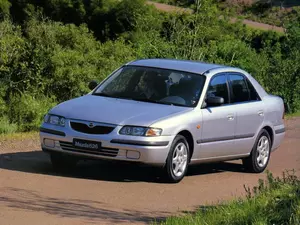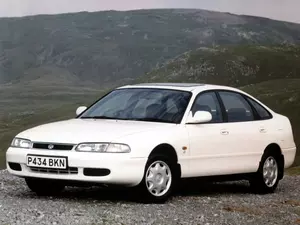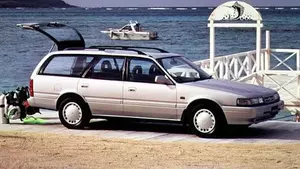
| Vehicle | Curb weight | Difference from world's smallest | Weight to power ratio | 0—60 mph acceleration ratio | Consumption ratio |
|---|---|---|---|---|---|
| 1.9 |
1180 kg / 2602 lbs |
755 kg (1665 lbs) heavier | 13 kg to 1 hp | 98 kg/s (216 lbs/s) | - |
| 2.0 |
1250 kg / 2756 lbs |
825 kg (1819 lbs) heavier | 9 kg to 1 hp | 137 kg/s (302 lbs/s) | - |
| 2.0 Turbo DI |
1275 kg / 2811 lbs |
850 kg (1874 lbs) heavier | 13 kg to 1 hp | 117 kg/s (258 lbs/s) |
232 kg/L (512 lbs/L) |
| 2.5 V6 |
1425 kg / 3142 lbs |
1000 kg (2205 lbs) heavier | 9 kg to 1 hp | 162 kg/s (357 lbs/s) | - |
| Vehicle | 1.9 |
|---|---|
| Curb weight |
1180 kg / 2602 lbs |
| Difference from world's smallest | 755 kg (755 lbs) heavier |
| Weight to power ratio | 13 kg to 1 hp |
| 0—60 mph acceleration ratio | 98 kg/s (216 lbs/s) |
| Consumption ratio | - |
| Vehicle | 2.0 |
| Curb weight |
1250 kg / 2756 lbs |
| Difference from world's smallest | 825 kg (825 lbs) heavier |
| Weight to power ratio | 9 kg to 1 hp |
| 0—60 mph acceleration ratio | 137 kg/s (302 lbs/s) |
| Consumption ratio | - |
| Vehicle | 2.0 Turbo DI |
| Curb weight |
1275 kg / 2811 lbs |
| Difference from world's smallest | 850 kg (850 lbs) heavier |
| Weight to power ratio | 13 kg to 1 hp |
| 0—60 mph acceleration ratio | 117 kg/s (258 lbs/s) |
| Consumption ratio |
232 kg/L (512 lbs/L) |
| Vehicle | 2.5 V6 |
| Curb weight |
1425 kg / 3142 lbs |
| Difference from world's smallest | 1000 kg (1000 lbs) heavier |
| Weight to power ratio | 9 kg to 1 hp |
| 0—60 mph acceleration ratio | 162 kg/s (357 lbs/s) |
| Consumption ratio | - |

| Vehicle | Curb weight | Difference from world's smallest | Weight to power ratio | 0—60 mph acceleration ratio | Consumption ratio |
|---|---|---|---|---|---|
| 1.9 |
1280 kg / 2822 lbs |
855 kg (1885 lbs) heavier | 14 kg to 1 hp | 104 kg/s (229 lbs/s) | - |
| 2.0 |
1280 kg / 2822 lbs |
855 kg (1885 lbs) heavier | 11 kg to 1 hp | 127 kg/s (280 lbs/s) | - |
| 2.0 Turbo DI |
1385 kg / 3054 lbs |
960 kg (2117 lbs) heavier | 14 kg to 1 hp | 108 kg/s (238 lbs/s) |
252 kg/L (556 lbs/L) |
| 2.0 H.P. |
1305 kg / 2878 lbs |
880 kg (1941 lbs) heavier | 10 kg to 1 hp | 131 kg/s (289 lbs/s) | - |
| Vehicle | 1.9 |
|---|---|
| Curb weight |
1280 kg / 2822 lbs |
| Difference from world's smallest | 855 kg (855 lbs) heavier |
| Weight to power ratio | 14 kg to 1 hp |
| 0—60 mph acceleration ratio | 104 kg/s (229 lbs/s) |
| Consumption ratio | - |
| Vehicle | 2.0 |
| Curb weight |
1280 kg / 2822 lbs |
| Difference from world's smallest | 855 kg (855 lbs) heavier |
| Weight to power ratio | 11 kg to 1 hp |
| 0—60 mph acceleration ratio | 127 kg/s (280 lbs/s) |
| Consumption ratio | - |
| Vehicle | 2.0 Turbo DI |
| Curb weight |
1385 kg / 3054 lbs |
| Difference from world's smallest | 960 kg (960 lbs) heavier |
| Weight to power ratio | 14 kg to 1 hp |
| 0—60 mph acceleration ratio | 108 kg/s (238 lbs/s) |
| Consumption ratio |
252 kg/L (556 lbs/L) |
| Vehicle | 2.0 H.P. |
| Curb weight |
1305 kg / 2878 lbs |
| Difference from world's smallest | 880 kg (880 lbs) heavier |
| Weight to power ratio | 10 kg to 1 hp |
| 0—60 mph acceleration ratio | 131 kg/s (289 lbs/s) |
| Consumption ratio | - |

| Vehicle | Curb weight | Difference from world's smallest | Weight to power ratio | 0—60 mph acceleration ratio | Consumption ratio |
|---|---|---|---|---|---|
| 1.9 |
1180 kg / 2602 lbs |
755 kg (1665 lbs) heavier | 13 kg to 1 hp | 98 kg/s (216 lbs/s) | - |
| 2.0 |
1250 kg / 2756 lbs |
825 kg (1819 lbs) heavier | 9 kg to 1 hp | 137 kg/s (302 lbs/s) | - |
| 2.0 |
1185 kg / 2613 lbs |
760 kg (1676 lbs) heavier | 10 kg to 1 hp | 126 kg/s (278 lbs/s) | - |
| 2.0 Turbo DI |
1275 kg / 2811 lbs |
850 kg (1874 lbs) heavier | 13 kg to 1 hp | 117 kg/s (258 lbs/s) |
232 kg/L (512 lbs/L) |
| Vehicle | 1.9 |
|---|---|
| Curb weight |
1180 kg / 2602 lbs |
| Difference from world's smallest | 755 kg (755 lbs) heavier |
| Weight to power ratio | 13 kg to 1 hp |
| 0—60 mph acceleration ratio | 98 kg/s (216 lbs/s) |
| Consumption ratio | - |
| Vehicle | 2.0 |
| Curb weight |
1250 kg / 2756 lbs |
| Difference from world's smallest | 825 kg (825 lbs) heavier |
| Weight to power ratio | 9 kg to 1 hp |
| 0—60 mph acceleration ratio | 137 kg/s (302 lbs/s) |
| Consumption ratio | - |
| Vehicle | 2.0 |
| Curb weight |
1185 kg / 2613 lbs |
| Difference from world's smallest | 760 kg (760 lbs) heavier |
| Weight to power ratio | 10 kg to 1 hp |
| 0—60 mph acceleration ratio | 126 kg/s (278 lbs/s) |
| Consumption ratio | - |
| Vehicle | 2.0 Turbo DI |
| Curb weight |
1275 kg / 2811 lbs |
| Difference from world's smallest | 850 kg (850 lbs) heavier |
| Weight to power ratio | 13 kg to 1 hp |
| 0—60 mph acceleration ratio | 117 kg/s (258 lbs/s) |
| Consumption ratio |
232 kg/L (512 lbs/L) |

| Vehicle | Curb weight | Difference from world's smallest | Weight to power ratio | 0—60 mph acceleration ratio | Consumption ratio |
|---|---|---|---|---|---|
| 1.8 |
1180 kg / 2602 lbs |
755 kg (1665 lbs) heavier | 11 kg to 1 hp | 123 kg/s (271 lbs/s) |
153 kg/L (337 lbs/L) |
| 2.0i |
1185 kg / 2613 lbs |
760 kg (1676 lbs) heavier | 10 kg to 1 hp | 129 kg/s (284 lbs/s) |
150 kg/L (331 lbs/L) |
| 2.0 D GLX Comprex |
1295 kg / 2855 lbs |
870 kg (1918 lbs) heavier | 17 kg to 1 hp | 93 kg/s (205 lbs/s) |
190 kg/L (419 lbs/L) |
| 2.5 24V |
1275 kg / 2811 lbs |
850 kg (1874 lbs) heavier | 8 kg to 1 hp | 157 kg/s (346 lbs/s) |
134 kg/L (295 lbs/L) |
| Vehicle | 1.8 |
|---|---|
| Curb weight |
1180 kg / 2602 lbs |
| Difference from world's smallest | 755 kg (755 lbs) heavier |
| Weight to power ratio | 11 kg to 1 hp |
| 0—60 mph acceleration ratio | 123 kg/s (271 lbs/s) |
| Consumption ratio |
153 kg/L (337 lbs/L) |
| Vehicle | 2.0i |
| Curb weight |
1185 kg / 2613 lbs |
| Difference from world's smallest | 760 kg (760 lbs) heavier |
| Weight to power ratio | 10 kg to 1 hp |
| 0—60 mph acceleration ratio | 129 kg/s (284 lbs/s) |
| Consumption ratio |
150 kg/L (331 lbs/L) |
| Vehicle | 2.0 D GLX Comprex |
| Curb weight |
1295 kg / 2855 lbs |
| Difference from world's smallest | 870 kg (870 lbs) heavier |
| Weight to power ratio | 17 kg to 1 hp |
| 0—60 mph acceleration ratio | 93 kg/s (205 lbs/s) |
| Consumption ratio |
190 kg/L (419 lbs/L) |
| Vehicle | 2.5 24V |
| Curb weight |
1275 kg / 2811 lbs |
| Difference from world's smallest | 850 kg (850 lbs) heavier |
| Weight to power ratio | 8 kg to 1 hp |
| 0—60 mph acceleration ratio | 157 kg/s (346 lbs/s) |
| Consumption ratio |
134 kg/L (295 lbs/L) |

| Vehicle | Curb weight | Difference from world's smallest | Weight to power ratio | 0—60 mph acceleration ratio | Consumption ratio |
|---|---|---|---|---|---|
| 2.0 D |
1305 kg / 2878 lbs |
880 kg (1941 lbs) heavier | 17 kg to 1 hp | 93 kg/s (205 lbs/s) |
195 kg/L (430 lbs/L) |
| 2.0 i |
1205 kg / 2657 lbs |
780 kg (1720 lbs) heavier | 13 kg to 1 hp | 107 kg/s (236 lbs/s) |
145 kg/L (320 lbs/L) |
| 2.2i |
1230 kg / 2712 lbs |
805 kg (1775 lbs) heavier | 11 kg to 1 hp | 127 kg/s (280 lbs/s) |
145 kg/L (320 lbs/L) |
| Vehicle | 2.0 D |
|---|---|
| Curb weight |
1305 kg / 2878 lbs |
| Difference from world's smallest | 880 kg (880 lbs) heavier |
| Weight to power ratio | 17 kg to 1 hp |
| 0—60 mph acceleration ratio | 93 kg/s (205 lbs/s) |
| Consumption ratio |
195 kg/L (430 lbs/L) |
| Vehicle | 2.0 i |
| Curb weight |
1205 kg / 2657 lbs |
| Difference from world's smallest | 780 kg (780 lbs) heavier |
| Weight to power ratio | 13 kg to 1 hp |
| 0—60 mph acceleration ratio | 107 kg/s (236 lbs/s) |
| Consumption ratio |
145 kg/L (320 lbs/L) |
| Vehicle | 2.2i |
| Curb weight |
1230 kg / 2712 lbs |
| Difference from world's smallest | 805 kg (805 lbs) heavier |
| Weight to power ratio | 11 kg to 1 hp |
| 0—60 mph acceleration ratio | 127 kg/s (280 lbs/s) |
| Consumption ratio |
145 kg/L (320 lbs/L) |

| Vehicle | Curb weight | Difference from world's smallest | Weight to power ratio | 0—60 mph acceleration ratio | Consumption ratio |
|---|---|---|---|---|---|
| 1.8 i |
1150 kg / 2536 lbs |
725 kg (1599 lbs) heavier | 11 kg to 1 hp | 120 kg/s (265 lbs/s) |
139 kg/L (306 lbs/L) |
| 2.0 D GLX Comprex |
1265 kg / 2789 lbs |
840 kg (1852 lbs) heavier | 17 kg to 1 hp | 90 kg/s (198 lbs/s) |
186 kg/L (410 lbs/L) |
| 2.0i |
1160 kg / 2558 lbs |
735 kg (1621 lbs) heavier | 10 kg to 1 hp | 126 kg/s (278 lbs/s) |
145 kg/L (320 lbs/L) |
| Vehicle | 1.8 i |
|---|---|
| Curb weight |
1150 kg / 2536 lbs |
| Difference from world's smallest | 725 kg (725 lbs) heavier |
| Weight to power ratio | 11 kg to 1 hp |
| 0—60 mph acceleration ratio | 120 kg/s (265 lbs/s) |
| Consumption ratio |
139 kg/L (306 lbs/L) |
| Vehicle | 2.0 D GLX Comprex |
| Curb weight |
1265 kg / 2789 lbs |
| Difference from world's smallest | 840 kg (840 lbs) heavier |
| Weight to power ratio | 17 kg to 1 hp |
| 0—60 mph acceleration ratio | 90 kg/s (198 lbs/s) |
| Consumption ratio |
186 kg/L (410 lbs/L) |
| Vehicle | 2.0i |
| Curb weight |
1160 kg / 2558 lbs |
| Difference from world's smallest | 735 kg (735 lbs) heavier |
| Weight to power ratio | 10 kg to 1 hp |
| 0—60 mph acceleration ratio | 126 kg/s (278 lbs/s) |
| Consumption ratio |
145 kg/L (320 lbs/L) |

| Vehicle | Curb weight | Difference from world's smallest | Weight to power ratio | 0—60 mph acceleration ratio | Consumption ratio |
|---|---|---|---|---|---|
| 2.0 |
1190 kg / 2624 lbs |
765 kg (1687 lbs) heavier | 12 kg to 1 hp | 117 kg/s (258 lbs/s) |
135 kg/L (298 lbs/L) |
| Vehicle | 2.0 |
|---|---|
| Curb weight |
1190 kg / 2624 lbs |
| Difference from world's smallest | 765 kg (765 lbs) heavier |
| Weight to power ratio | 12 kg to 1 hp |
| 0—60 mph acceleration ratio | 117 kg/s (258 lbs/s) |
| Consumption ratio |
135 kg/L (298 lbs/L) |